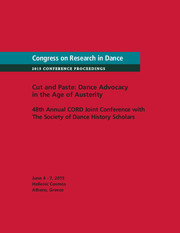No CrossRef data available.
Article contents
Aesthetic Education and Reform: The German Approach to Dance Education
Published online by Cambridge University Press: 04 January 2013
Abstract
Dance education in Germany is traditionally based upon the concept of “aesthetic education.” This presentation delineates Rousseau's original terminology, contrasting it with the German interpretation, which reduces the originally reflexive idea to a simple antithesis of rationalism. This dualistic development is key to understanding the systematic exclusion of dance from formal education: at the moment in which dance is relegated to be the “other” of rationalism, it is guaranteed a position outside of rationally based educational concepts. The study of other art forms is included therein; why not dancei Is dance Germany's last bastion of irrationality?
- Type
- Panel: The Dilemma of German Dance Education: Historical and Current Inconsistencies
- Information
- Copyright
- Copyright © The Author(s) 2009


